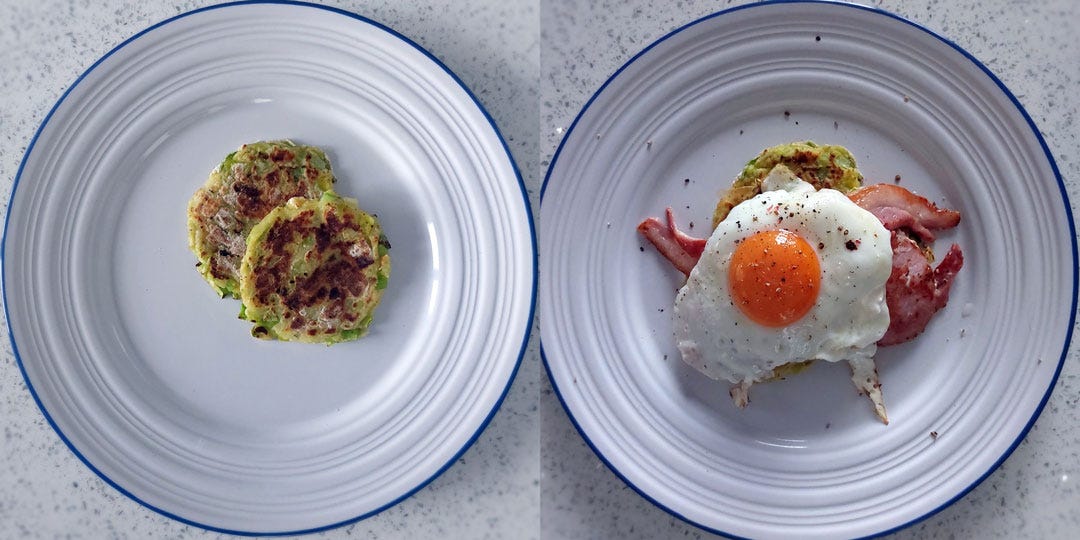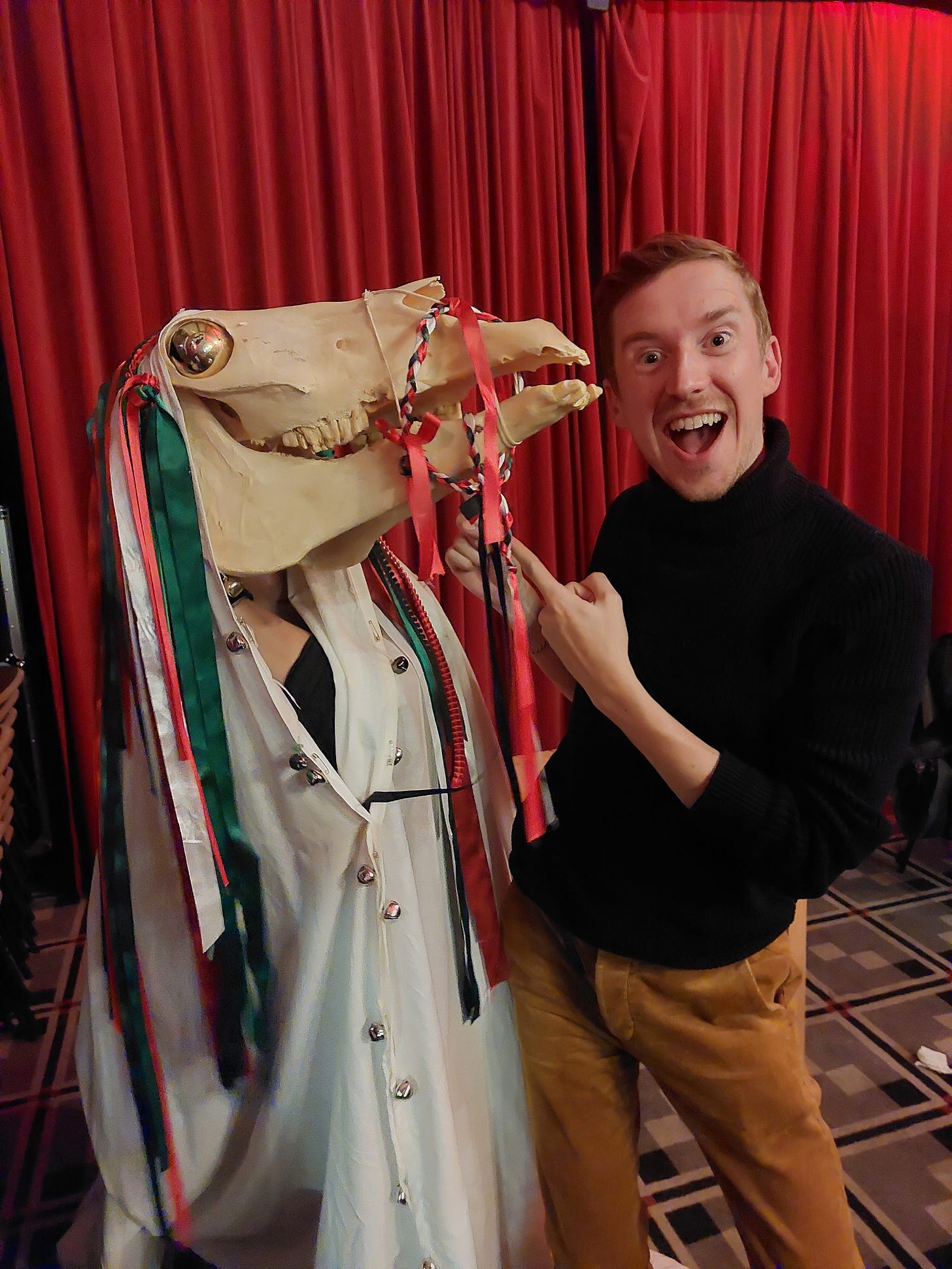What do you eat when you don’t know what to eat?
Leek and potato breakfast cakes recipe
It might come as a bit of a surprise, but until the age of about 16, I was a fussy eater. I played it safe where food was involved, opting for the familiar and comforting rather than the unknown or exotic. I liked Sunday dinners (roasts), sausage, beans and chips, fish fingers, bread and butter, ham sandwiches. Talking of ham sandwiches, I must have eaten one every day of the school term between the ages of five and 11. My packed lunch – of my own choosing although I guess it made it easier for my mum – was a white bread ham sandwich, an apple that had been peeled and cut up into bits (my fellow students and the occasional dinnerlady often thought they were chips), and a chocolate bar (usually a fruit Club or a mint Viscount). I say every day, but in fact on Wednesdays, I went home for lunch where my nan would prepare either chicken soup, homemade stew, or a heated-up tin of beans and sausage in a tin – all served with liberally buttered bread. It was the same every week and I loved it.
I quite like routine and my food pattern back then certainly suggested it. But as I’ve matured and my palate has changed and I realised I was missing out on heat and sour and spice and bitter, my routine has become a bit more flexible and spontaneous – in fact, so much so that I’d say that I’m almost the complete opposite. I’ll try anything. Chicken sashimi (raw chicken sushi) in Japan? No problem. Stewed pig’s trotters? Why not? Bone marrow on toast? Bring it on. I’m lucky, of course, that my job as a food and travel writer not just allows me, but requires me, to try new foods and drinks around the globe. I love it when there’s something I haven’t eaten before on the menu – even if I hate it (mussels and tripe, I’m looking at you).
I also love to cook and play around with food in my kitchen – that’s why this newsletter exists. But with all the choice and opportunity, sometimes I just don’t know what I want to eat. It is an unenviable situation that I now realise I often put my mother in. Luckily, my mum found the solution: banana on toast. If I ever didn’t know what I wanted or I was in one of my fussy moods, she’d make me banana on toast. It worked every time. Well-toasted bread with salty butter and sliced rounds of banana. To this day, if I don’t know what I want to eat, I’ll make banana on toast. I remember once saying that my mum made the best toast of anyone in the family. An accolade I’m not sure my mum thought showed of her true culinary talents – but then she was completing with my grandmothers. She is also the undisputed queen of mashed potatoes.
It makes me wonder if other people have a go-to meal or food when they just don’t know what they fancy or are feeling a bit under-the-weather or in that ‘it’s Wednesday after a long day at work and I can’t be bothered to cook’ mood. Feel free to let me know what yours is.
The Recipe
Leek and potato breakfast cakes
I erroneously bought a ginormous bag of potatoes the other day (although who doesn’t love potatoes?), and I’ve been trying to use them up in a variety of ways ever since. There’s been roast potatoes, mash, hash browns, and these potato cakes. Looking in my old Welsh recipe books, potato cakes come up a lot but mainly as a baked sweet cake. I’ve been trying to perfect the sweet potato cake but I’m still not sold on its texture and consistency to put it in the newsletter. It may be one of those recipes that’s best left in the past. But these potato cakes (a bit like a farl) are cooked on the bakestone and are savoury – and I think go well with bacon and eggs for breakfast, although they would also suit a light lunch with salmon maybe.
Ingredients (makes 10)
500g potatoes (about 400g when cooked)
60g butter
80g flour
3 tbsp milk
1 small leek, finely chopped
2 tsp English mustard
1tsp parsley
Pepper and Halen Môn Welsh salt
Method
Boil the potatoes in salted water until tender. Drain and allow to cool slightly and dry out a bit.
Preheat your bakestone and brush with oil or melted butter.
In a large bowl (or the saucepan you boiled them in if you want to save on washing up), mash the potatoes with the butter.
Mix in the flour and stir well to combine.
Add the leek, mustard, parsley and season with salt and pepper and mix well.
Using a little flour, roll out the mix (which should be dough like) to about the thickness of a finger, and cut out large rounds.
Cook for a few minutes on the bakestone before flipping and cooking for a further 3-4 minutes until brown and crisp on the outside.
Serve with bacon and a fried egg and perhaps a few chilli flakes.
If you try the recipe out, don’t forget to tag any photos with #mywelshkitchen.
The Playlist
To me, cooking and music go hand in hand, whether that’s singing at the top of your voice using a wooden spoon as a microphone while waiting for pasta to boil, or dancing around with the oven gloves on as the oven timer counts down. Here are this week’s ideas for your Welsh Kitchen playlist.
On the playlist this week we are celebrating the life of the late Glynis Johns who died recently at the age of 100, whose father actor Mervyn Johns was born in Pembroke, and who considered herself Welsh. We’re also celebrating our Shirl, who turned 87 this month, with her performance at the 2022 Bafta Awards.
Send In The Clowns by Glynis Johns
Sister Suffragette by Glynis Johns
Diamonds Are Forever by Dame Shirley Bassey
And now for something completely different
I can’t stop watching this Jaffa Cakes advert starring Welsh icon Bonnie Tyler.
And here’s me with the Mari Lwyd at the London Welsh Centre’s annual celebration.



